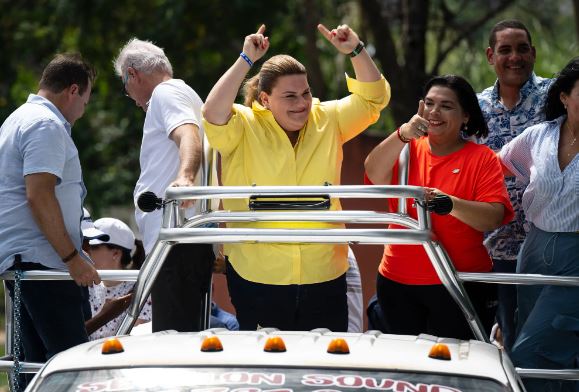Gov. Pedro R. Pierluisi of Puerto Rico lost his bid for a second term on Sunday, marking a rare defeat for an incumbent governor on the island. Representative Jenniffer González-Colón, Puerto Rico’s nonvoting member of Congress, won the primary for the governing New Progressive Party (NPP), which advocates for Puerto Rican statehood. The Associated Press reported this surprising turn of events following a highly contentious primary.
Pierluisi and González-Colón had previously run as allies on the same ticket four years ago, vowing unity after a turbulent period that saw the resignation of a former NPP governor. However, in this primary, González-Colón, once Pierluisi’s ally, criticized his administration as out of touch and ineffective, casting him as an obstacle to progress.
Puerto Rican politics often do not align neatly with mainland U.S. partisan politics. Although both Pierluisi and González-Colón are members of the pro-statehood NPP, Pierluisi is a Democrat while González-Colón is a Republican.
In another primary held on Sunday for the Popular Democratic Party (PDP), which supports maintaining Puerto Rico’s status as a U.S. territory, State Representative Jesús Manuel Ortiz defeated State Senator Juan Zaragoza by a substantial margin. The winners of these primaries will face off in the general election scheduled for November 5.
Puerto Rico has been striving to rebuild its fragile economy following severe challenges including a financial crisis, bankruptcy, Hurricane Maria, and the coronavirus pandemic. Despite efforts, many Puerto Ricans remain deeply frustrated by persistent power outages, a housing crisis, high living costs, and the slow pace of reconstruction following Hurricane Maria, a Category 4 storm that devastated the island in 2017.
The continuous upheaval has spurred a shift in Puerto Rican politics. The island’s traditionally dominant parties, the NPP and PDP, are seeing growing support for newer, smaller parties less focused on the island’s political status. In the 2020 election, one of these newer parties, the Citizen Victory Movement (MVC), attracted many younger voters with its pledge to address economic and social issues. Another new party, Project Dignity, appealed to Christian conservatives with its right-wing social agenda.
Ahead of this year’s election, the MVC formed an alliance with the Puerto Rican Independence Party (PIP), one of the island’s smaller parties. Their joint candidate for governor is Juan Dalmau, a former state senator known for his advocacy for Puerto Rican independence.
Pierluisi’s tenure as governor began in 2020 when he defeated his successor, Gov. Wanda Vázquez, in that year’s primary. Vázquez had become governor under unusual circumstances following the resignation of former Gov. Ricardo A. Rosselló amid massive protests in 2019. The protests erupted after private messages leaked, showing Rosselló and his closest aides insulting Puerto Ricans, leading to widespread outrage.
Pierluisi was initially chosen by Rosselló to succeed him, but the Puerto Rico Supreme Court ruled the appointment improper, resulting in Pierluisi serving as the de facto governor for five days before Vázquez assumed the role.
During his campaign for re-election, Pierluisi highlighted the economic improvements and ongoing projects from his first term. He touted these achievements as evidence of his effective leadership. However, González-Colón condemned public corruption, a long-standing issue in Puerto Rican governance, and capitalized on public dissatisfaction with economic hardships and day-to-day living conditions.
González-Colón’s victory reflects a growing sentiment among Puerto Ricans for change. Her campaign resonated with voters frustrated by ongoing economic issues, power outages, and the slow recovery from past disasters. Her ability to address these pocketbook issues and her stance against corruption appealed to many who felt Pierluisi’s administration had failed to deliver on its promises.
As Puerto Rico heads towards the general election in November, the political landscape continues to evolve, with established parties facing significant challenges from newer, issue-focused movements. The outcome of the election will shape the future direction of the island, particularly its relationship with the United States and its ongoing recovery efforts.

